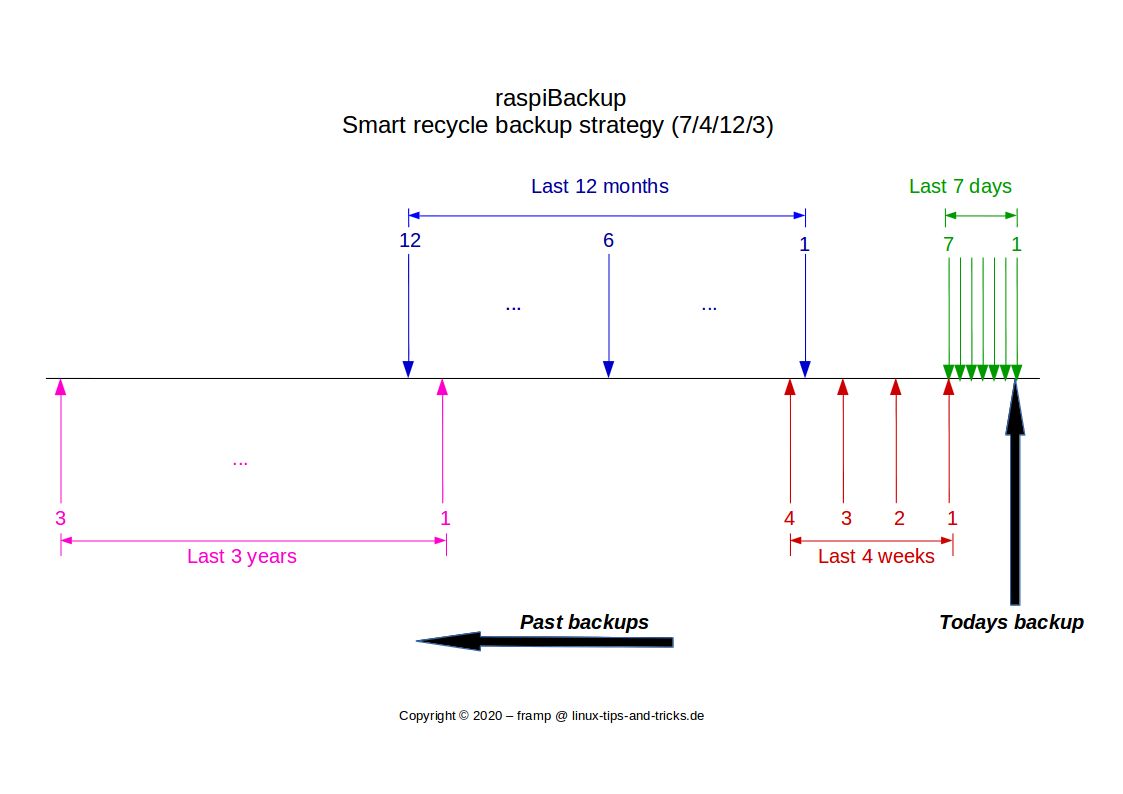Intelligent rotation strategy - Smart Recycle
raspiBackup can either keep a configurable number of backups or use an intelligent backup rotation strategy. It is also called the "generation principle of data backup". The implementation was inspired by Manuel Dewald's article "Automating backups on a Raspberry Pi NAS". The following backups are then kept by default, if daily backups are created:
- Backups of the current day and the last 6 days
- Backups of the current week and the last 3 weeks
- Backups of the current month and the last 11 months
- Backups of the current year and the last 2 years
This can be adapted to the respective requirements using the installer.
If weekly backups are created, the daily backups are of course omitted. The respective retention periods for daily, weekly, monthly and yearly backups can be manually configured with options.
So if you only want to have weekly, monthly and annual backups, this can be configured. It should be noted that the weekly backup day then defines the backup day of the month: If, for example, Monday is configured as weekly backup day, the monthly backup is always on the first Monday of the month and the annual backup on the first Monday of the year.
If several daily backups are created, the newest daily backup is always kept. For the weekly, monthly and annual backups the oldest backups are kept.
For example, with two existing daily backups from 10:00 and 13:00, the backup created at 13:00 is selected.
If there are backups on Monday and Friday during the week, the weekly backup of Monday is selected.
If there is a backup on the 1st, 10th and 20th of a month, the backup from the 1st is selected for the monthly backup.
For daily backups, weekly backups are therefore always from Monday, monthly backups always from the first of the month and annual backups always from the 1st of the year.
Graphical representation

Example - backup directory (daily backup run, default options: 7/4/12/3)
(backup run on 17.11.2019)
20191117 1. daily backup
20191116 2. daily backup
20191115 3. daily backup
20191114 4. Daily backup
20191113 5. Daily backup
20191112 6. Daily backup
20191111 7. Daily and 1st weekly backup
20191101 1. monthly backup
20191104 2. weekly backup
20191001 2. monthly backup
20191028 3. weekly backup
20191021 4. Weekly backup
20190901 3. monthly backup
20190801 4. monthly backup
20190701 5. monthly backup
20190601 6. Monthly backup
20190501 7. Monthly backup
20190401 8. Monthly backup
20190301 9. monthly backup
20190201 10.monthly backup
20190101 11. Monthly backup and 1st annual backup
20181201 12. Monthly backup
20180101 2. yearly backup
20170101 3. annual backup
Options
The intelligent rotation strategy is activated with the --smartRecycle option.
The storage quantities can be configured with the --smartRecycleOptions option.
The --smartRecycleOptions "7 4 12 3" option is active by default.
With --smartRecycleOptions "0 4 12 0", for example, the last 4
weekly and the last 12 monthly backups are retained.
As long as the option --smarteRecycleDryrun is not switched off
raspiBackup only writes messages about which backups would be deleted and which would be kept.
You can therefore first check whether the result corresponds to what you want. This prevents existing backups from being deleted unintentionally.
This is particularly important if, after switching to the intelligent rotation strategy you want to continue using the previous backup directory and not use a new directory.
If you have carefully checked that the intelligent rotation strategy deletes the
correct backups and removes the desired backups, the
option --smartRecycleDryrun- (note the - at the end!) in each backup run
the intelligent rotation strategy is applied and
backups that are no longer required are deleted unrecoverable.
Alternatively, the configuration option
DEFAULT_SMART_RECYCLE_DRYRUN=0
produces the same result.
On Wikipedia - in the article Generation principle - it is nicely explained how the rotation principle works. The diagram in particular is another way of explaining the principle.